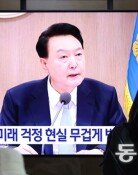Is the Korean Peninsula truly at peril?
Is the Korean Peninsula truly at peril?
Posted April. 11, 2017 07:13,
Updated April. 11, 2017 07:20
The U.S. navy is planning to make additional deployment of the aircraft carrier USS Ronald Reagan lying at anchor off the sea of Japan, and the amphibious assault ship USS Bonhomme Richard sometime around the end of this month after having recently dispatched the entire fleet of the nuclear-powered aircraft USS Carl Vinson to the Korean peninsula. The USS Makin Island and America-class amphibious assault ships, which are carrying massive marine forces ready to make a landing after raid mission, are currently on standby in the western Pacific Ocean. At around half the entire fleet of U.S. navy’s aircraft carriers operated in the Pacific, the deployment of the military assets is the largest ever in size since the two Koreas reached an armistice treaty. In addition, the ROK and U.S. militaries are staging the largest joint logistics drill at Dogu Beach of Pohang in North Gyeongsang Province to prepare for the event when the port is destroyed. The urgency is such that focusing on the upcoming presidential election is becoming a luxury that South Korea cannot afford at the moment.
As Pyongyang is expected to make nuclear and missile provocations this month, tension on the Korean Peninsula is hitting a new high since the ceasefire was reached in 1953. Foreign investors are selling their shares, and the appreciation of the Korean won is spiking. While not confirmed by the U.S. government yet, the red line of preemptive strike is expected to be North Korea’s sixth nuclear test or the regime’s test-firing of intercontinental ballistic missiles. It is speculated that the North will launch provocations on the 105th anniversary of the birthday of Kim Il Sung, the founder of North Korea, which falls on April 15, or the 85th anniversary of the foundation of the Korean People’s Army, which is on April 25. If Pyongyang ignores the warnings from the U.S., military actions against the regime might be inevitable.
During an interview with CBS on Sunday, U.S. Secretary of State Rex Tillerson said that the U.S. could start thinking about reopening talks with North Korea if it stops nuclear and missiles tests. "We've been very clear that our objective is a de-nuclearized Korean peninsula, we have no objective to change the regime in North Korea,” he said. While such stance sounds very different from the hawkish measures that the U.S. is considering such as preemptive strike, deployment of tactical nuclear missiles on the Korean Peninsula, assassination of Kim Jong Un, this shows that the South’s long-standing ally is keeping open the door to dialogues while imposing strong economic sanctions on the North through cooperating with China. If China can talk with the North out of its nuclear ambition or if the communist nation voluntarily puts an end to or gives up on its nuclear program, a breakthrough could be yielded for denuclearization of North Korea. Naturally, keen attention is being paid to China’s top nuclear envoy Wu Dawei’s visit to Seoul on Monday as well as to U.S. Vice President Mike Pence's visit on April 16.
Be it preemptive strike or an unexpected dialogue between Washington and Pyongyang, both constitute a crisis for South Korea. Far from securing the close cooperation with the U.S. that is vital in dealing with each scenario, however, the South Korean government has not even chosen its stance on such critical issues as preemptive strike, deployment of tactical nuclear missiles, and terms of U.S.-North dialogue. We might witness the case of "Korea Passing" a newly coined term referring to a situation where the diplomatic fate of the Korean Peninsula is dictated by other countries. “Seoul might turn into a sea of fire,” said former Japanese Cabinet Minister Ishiba on Sunday, a favorite from Japan’s ruling Liberal Democratic Party running for the prime minister’s office, calling for measures to rescue Japanese citizens in Seoul. Such a remark was publicly made by such an influential politician, which is simply petrifying. At such a transitional juncture, the South Korean government has yet to offer a diagnosis or a solution for its people, leaving them frustrated and unnerved.
Headline News
- Israel prepares for retaliation against Iran
- Samsung reclaims top spot, surpassing Apple in smartphone market
- 77% of Koreans in 20s and 30s are 'Kangaroo Tribe' due to job crisis
- KBO referees embroiled in controversy over ABS decision concealment
- Inflation, oil price surge put double shock on global economy






